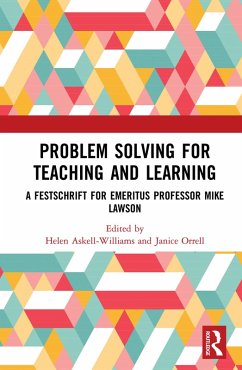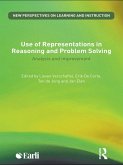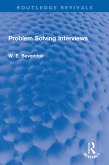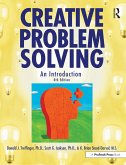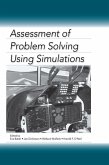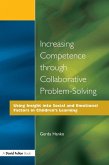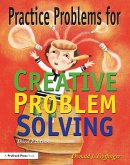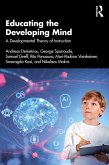Problem Solving for Teaching and Learning (eBook, ePUB)
A Festschrift for Emeritus Professor Mike Lawson
Redaktion: Askell-Williams, Helen; Orrell, Janice
41,95 €
41,95 €
inkl. MwSt.
Sofort per Download lieferbar

21 °P sammeln
41,95 €
Als Download kaufen

41,95 €
inkl. MwSt.
Sofort per Download lieferbar

21 °P sammeln
Jetzt verschenken
Alle Infos zum eBook verschenken
41,95 €
inkl. MwSt.
Sofort per Download lieferbar
Alle Infos zum eBook verschenken

21 °P sammeln
Problem Solving for Teaching and Learning (eBook, ePUB)
A Festschrift for Emeritus Professor Mike Lawson
Redaktion: Askell-Williams, Helen; Orrell, Janice
- Format: ePub
- Merkliste
- Auf die Merkliste
- Bewerten Bewerten
- Teilen
- Produkt teilen
- Produkterinnerung
- Produkterinnerung

Bitte loggen Sie sich zunächst in Ihr Kundenkonto ein oder registrieren Sie sich bei
bücher.de, um das eBook-Abo tolino select nutzen zu können.
Hier können Sie sich einloggen
Hier können Sie sich einloggen
Sie sind bereits eingeloggt. Klicken Sie auf 2. tolino select Abo, um fortzufahren.

Bitte loggen Sie sich zunächst in Ihr Kundenkonto ein oder registrieren Sie sich bei bücher.de, um das eBook-Abo tolino select nutzen zu können.
This text explores the importance that problem solving has in learning in everyday personal and social contexts. It also suggests how effective problem solving activities can be incorporated more explicitly in learning and teaching and examines the benefits of this approach.
- Geräte: eReader
- mit Kopierschutz
- eBook Hilfe
Andere Kunden interessierten sich auch für
![Use of Representations in Reasoning and Problem Solving (eBook, ePUB) Use of Representations in Reasoning and Problem Solving (eBook, ePUB)]() Use of Representations in Reasoning and Problem Solving (eBook, ePUB)61,95 €
Use of Representations in Reasoning and Problem Solving (eBook, ePUB)61,95 €![Problem Solving Interviews (eBook, ePUB) Problem Solving Interviews (eBook, ePUB)]() W. E. BeveridgeProblem Solving Interviews (eBook, ePUB)30,95 €
W. E. BeveridgeProblem Solving Interviews (eBook, ePUB)30,95 €![Creative Problem Solving (eBook, ePUB) Creative Problem Solving (eBook, ePUB)]() Donald J. TreffingerCreative Problem Solving (eBook, ePUB)20,95 €
Donald J. TreffingerCreative Problem Solving (eBook, ePUB)20,95 €![Assessment of Problem Solving Using Simulations (eBook, ePUB) Assessment of Problem Solving Using Simulations (eBook, ePUB)]() Assessment of Problem Solving Using Simulations (eBook, ePUB)48,95 €
Assessment of Problem Solving Using Simulations (eBook, ePUB)48,95 €![Increasing Competence Through Collaborative Problem-Solving (eBook, ePUB) Increasing Competence Through Collaborative Problem-Solving (eBook, ePUB)]() Gerda HankoIncreasing Competence Through Collaborative Problem-Solving (eBook, ePUB)38,95 €
Gerda HankoIncreasing Competence Through Collaborative Problem-Solving (eBook, ePUB)38,95 €![Practice Problems for Creative Problem Solving (eBook, ePUB) Practice Problems for Creative Problem Solving (eBook, ePUB)]() Donald J. TreffingerPractice Problems for Creative Problem Solving (eBook, ePUB)15,95 €
Donald J. TreffingerPractice Problems for Creative Problem Solving (eBook, ePUB)15,95 €![Educating the Developing Mind (eBook, ePUB) Educating the Developing Mind (eBook, ePUB)]() Andreas DemetriouEducating the Developing Mind (eBook, ePUB)39,95 €
Andreas DemetriouEducating the Developing Mind (eBook, ePUB)39,95 €-
-
-
This text explores the importance that problem solving has in learning in everyday personal and social contexts. It also suggests how effective problem solving activities can be incorporated more explicitly in learning and teaching and examines the benefits of this approach.
Hinweis: Dieser Artikel kann nur an eine deutsche Lieferadresse ausgeliefert werden.
Dieser Download kann aus rechtlichen Gründen nur mit Rechnungsadresse in A, B, BG, CY, CZ, D, DK, EW, E, FIN, F, GR, HR, H, IRL, I, LT, L, LR, M, NL, PL, P, R, S, SLO, SK ausgeliefert werden.
Hinweis: Dieser Artikel kann nur an eine deutsche Lieferadresse ausgeliefert werden.
Produktdetails
- Produktdetails
- Verlag: Taylor & Francis eBooks
- Seitenzahl: 306
- Erscheinungstermin: 26. Juni 2019
- Englisch
- ISBN-13: 9780429684081
- Artikelnr.: 58397486
- Verlag: Taylor & Francis eBooks
- Seitenzahl: 306
- Erscheinungstermin: 26. Juni 2019
- Englisch
- ISBN-13: 9780429684081
- Artikelnr.: 58397486
- Herstellerkennzeichnung Die Herstellerinformationen sind derzeit nicht verfügbar.
Helen Askell-Williams (PhD) is an Associate Professor of Education at Flinders University. Helen teaches cognitive psychology and educational practice and building positive mental health in school communities. Her research focusses on teachers' and learners' knowledge about learning, and on promoting student wellbeing and positive mental health. Her most recent research is leading an Australian Research Council Discovery Grant project, Sustainability of Effective Educational Initiatives, investigating features that support the long-term success of educational programs. Janice Orrell is an Emeritus Professor of Higher Education and Assessment in the College of Education, Psychology and Social Work at Flinders University. Her work largely focusses on assessment and work integrated learning in higher education. Her recent research focusses on initial teacher education and pre-service teachers' thinking about the work and role of teachers. She works with a non-formal school for tribal and Dalit women in southern India focussing on non-formal education for liberation and empowerment.
Section 1: Setting the Scene, 1: Michael Lawson: Teacher of Teachers and
Researchers, and Academic Citizen, 2: Learning is a Problem-solving
Activity, Section 2: Conceptualising Problem Solving, 3: Human Problem
Solving and Instructional Design, 4: Academic Challenges as Opportunities
to Learn to Self-regulate Learning, 5: Word Knowledge Quality and Literacy,
6: Developing Problem Solving and Other General Capabilities: What Will It
Take and How Can We Be Sure of Success?, 7: Messy Problems of Personal and
Family Life: Solving Inheritance Problems, Section 3: Teachers' Knowledge
and Beliefs about Problem Solving, 8: Teachers' Beliefs and Knowledge, 9:
The Quality of Knowledge and Beliefs that Teachers Use When Solving
Teaching and Learning Problems, 10: Problematising Assessment of Student
Learning, 11: Types of Knowledge Teachers Use When Solving Educational
Problems: A Case Study of the Implementation of the Promoting Alternative
Thinking Strategies (PATHS) Program , Section 4: Fostering Students'
Problem-solving Capabilities, 12: Problem Solving by Students with
Intellectual Disability, Chapter 13: What Gifted Students and a Regular
Class of Primary School Students Know and Do about Problem Solving, Chapter
14: Problem Solving Using the Keyword Method and Mental Imagery During
Vocabulary Recall, Chapter 15: The Advantages and Disadvantages of
Problem-solving Practice When Learning Basic Addition Facts, Chapter 16:
Problem Solving in Mathematics: Evidence of High-gain Strategies, Chapter
17: Synergy between Teachers' Knowledge and Students' Learning:
Perspectives from Research on Mathematics Education, Chapter 18:
Reflections on a Ten-year Research Partnership with Glenunga International
High School
Researchers, and Academic Citizen, 2: Learning is a Problem-solving
Activity, Section 2: Conceptualising Problem Solving, 3: Human Problem
Solving and Instructional Design, 4: Academic Challenges as Opportunities
to Learn to Self-regulate Learning, 5: Word Knowledge Quality and Literacy,
6: Developing Problem Solving and Other General Capabilities: What Will It
Take and How Can We Be Sure of Success?, 7: Messy Problems of Personal and
Family Life: Solving Inheritance Problems, Section 3: Teachers' Knowledge
and Beliefs about Problem Solving, 8: Teachers' Beliefs and Knowledge, 9:
The Quality of Knowledge and Beliefs that Teachers Use When Solving
Teaching and Learning Problems, 10: Problematising Assessment of Student
Learning, 11: Types of Knowledge Teachers Use When Solving Educational
Problems: A Case Study of the Implementation of the Promoting Alternative
Thinking Strategies (PATHS) Program , Section 4: Fostering Students'
Problem-solving Capabilities, 12: Problem Solving by Students with
Intellectual Disability, Chapter 13: What Gifted Students and a Regular
Class of Primary School Students Know and Do about Problem Solving, Chapter
14: Problem Solving Using the Keyword Method and Mental Imagery During
Vocabulary Recall, Chapter 15: The Advantages and Disadvantages of
Problem-solving Practice When Learning Basic Addition Facts, Chapter 16:
Problem Solving in Mathematics: Evidence of High-gain Strategies, Chapter
17: Synergy between Teachers' Knowledge and Students' Learning:
Perspectives from Research on Mathematics Education, Chapter 18:
Reflections on a Ten-year Research Partnership with Glenunga International
High School
Section 1: Setting the Scene, 1: Michael Lawson: Teacher of Teachers and
Researchers, and Academic Citizen, 2: Learning is a Problem-solving
Activity, Section 2: Conceptualising Problem Solving, 3: Human Problem
Solving and Instructional Design, 4: Academic Challenges as Opportunities
to Learn to Self-regulate Learning, 5: Word Knowledge Quality and Literacy,
6: Developing Problem Solving and Other General Capabilities: What Will It
Take and How Can We Be Sure of Success?, 7: Messy Problems of Personal and
Family Life: Solving Inheritance Problems, Section 3: Teachers' Knowledge
and Beliefs about Problem Solving, 8: Teachers' Beliefs and Knowledge, 9:
The Quality of Knowledge and Beliefs that Teachers Use When Solving
Teaching and Learning Problems, 10: Problematising Assessment of Student
Learning, 11: Types of Knowledge Teachers Use When Solving Educational
Problems: A Case Study of the Implementation of the Promoting Alternative
Thinking Strategies (PATHS) Program , Section 4: Fostering Students'
Problem-solving Capabilities, 12: Problem Solving by Students with
Intellectual Disability, Chapter 13: What Gifted Students and a Regular
Class of Primary School Students Know and Do about Problem Solving, Chapter
14: Problem Solving Using the Keyword Method and Mental Imagery During
Vocabulary Recall, Chapter 15: The Advantages and Disadvantages of
Problem-solving Practice When Learning Basic Addition Facts, Chapter 16:
Problem Solving in Mathematics: Evidence of High-gain Strategies, Chapter
17: Synergy between Teachers' Knowledge and Students' Learning:
Perspectives from Research on Mathematics Education, Chapter 18:
Reflections on a Ten-year Research Partnership with Glenunga International
High School
Researchers, and Academic Citizen, 2: Learning is a Problem-solving
Activity, Section 2: Conceptualising Problem Solving, 3: Human Problem
Solving and Instructional Design, 4: Academic Challenges as Opportunities
to Learn to Self-regulate Learning, 5: Word Knowledge Quality and Literacy,
6: Developing Problem Solving and Other General Capabilities: What Will It
Take and How Can We Be Sure of Success?, 7: Messy Problems of Personal and
Family Life: Solving Inheritance Problems, Section 3: Teachers' Knowledge
and Beliefs about Problem Solving, 8: Teachers' Beliefs and Knowledge, 9:
The Quality of Knowledge and Beliefs that Teachers Use When Solving
Teaching and Learning Problems, 10: Problematising Assessment of Student
Learning, 11: Types of Knowledge Teachers Use When Solving Educational
Problems: A Case Study of the Implementation of the Promoting Alternative
Thinking Strategies (PATHS) Program , Section 4: Fostering Students'
Problem-solving Capabilities, 12: Problem Solving by Students with
Intellectual Disability, Chapter 13: What Gifted Students and a Regular
Class of Primary School Students Know and Do about Problem Solving, Chapter
14: Problem Solving Using the Keyword Method and Mental Imagery During
Vocabulary Recall, Chapter 15: The Advantages and Disadvantages of
Problem-solving Practice When Learning Basic Addition Facts, Chapter 16:
Problem Solving in Mathematics: Evidence of High-gain Strategies, Chapter
17: Synergy between Teachers' Knowledge and Students' Learning:
Perspectives from Research on Mathematics Education, Chapter 18:
Reflections on a Ten-year Research Partnership with Glenunga International
High School
